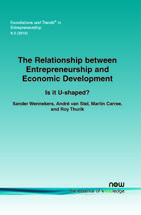The Relationship between Entrepreneurship and Economic Development: Is It U-Shaped?
By Sander Wennekers, EIM Business and Policy Research, the Netherlands, awe@eim.nl | André van Stel, EIM Business and Policy Research | Martin Carree, Maastricht University | Roy Thurik, Erasmus University Rotterdam and EIM Business and Policy Research and Max Planck Institute of Economics
Abstract
Following a centuries-long decline in the rate of self-employment, a discontinuity in this downward trend is observed for many advanced economies starting in the 1970s and 1980s. In some countries, the rate of self-employment appears to increase. At the same time, crosssectional analysis shows a U-shaped relationship between start-up rates of enterprise and levels of economic development. We provide an overview of the empirical evidence concerning the relationship between independent entrepreneurship, also known as self-employment or business ownership, and economic development. We argue that the reemergence of independent entrepreneurship is based on at least two 'revolutions'. If we distinguish between solo self-employed at the lower end of the entrepreneurship spectrum, and ambitious and/or innovative entrepreneurs at the upper end, many advanced economies show a revival at both extremes. Policymakers in advanced economies should be aware of both revolutions and tailor their policies accordingly.
The Relationship between Entrepreneurship and Economic Development
The Relationship between Entrepreneurship and Economic Development summarizes and updates the empirical evidence and presents the main lines of reasoning behind the relationship between economic development and entrepreneurship. It is essential reading for policy makers because it provides them with a benchmark how to evaluate their country's specific entrepreneurship - economic development ratio as well as with an understanding what the developments are and how to influence them. The Relationship between Entrepreneurship and Economic Development focuses on the occupational notion of entrepreneurship. It reviews the long historical decline in the rate of independent entrepreneurship, investigates the evidence supporting the revival of independent entrepreneurship, interprets the various findings including to what extent the shift from the so-called 'managed' to the 'entrepreneurial' economy is a labor market phenomenon and to what extent these new push and pull factors in the labor market share the stage with a changing relationship between entrepreneurship and innovation.
